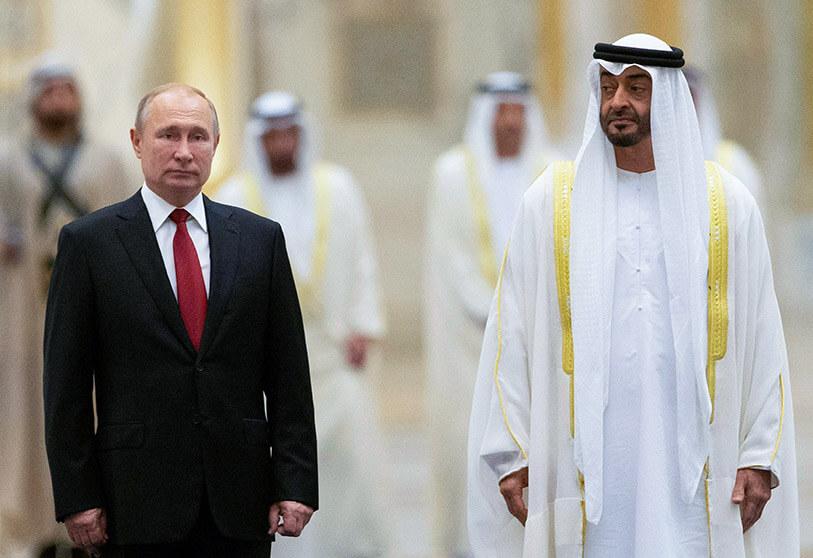This is bin Zayed's first visit to Moscow since he assumed the presidency of the UAE following the death of his half-brother Sheikh Khalifa bin Zayed in May.
UAE state media said the visit was part of Abu Dhabi's efforts to mediate in the Ukraine war, help de-escalate military tensions, and create grounds for the start of negotiations between Moscow and Kiev to achieve peace and security.
Eight months after the start of Russia's “special military operation” in Ukraine, war has intensified in recent days following a series of advances by Kiev forces and an explosion at a strategic bridge connecting the Crimean Peninsula to Russian mainland, which Moscow blames on the Ukrainian secret services. In retaliation, Russian missiles hit Ukraine's capital and other cities across the country on Monday, and Putin threatened more attacks in the coming days and weeks.
The intensification of conflict is due to the fact that the West, especially the US, has launched massive propaganda against the Kremlin in recent days regarding the occurrence of a nuclear war after Moscow officials threatened to use strategic weapons for self-defense.
The UAE, like most countries in the Persian Gulf region, has shown no desire to condemn Russia's military action in Ukraine and Moscow's expulsion from the OPEC+ after the start of the war in Ukraine.
The UAE itself is part of the OPEC+ bloc led by Saudi Arabia and Russia, which last week decided to cut production by 2 million barrels per day, the largest cut in oil output since May 2020 and equal to 2 percent of global crude supply.
This OPEC and its ten foreign allies’ action was strongly criticized by Washington and other Western countries, because they have been asking the bloc for months to provide conditions for reducing fuel and energy prices. By imposing a price ceiling on Russian oil, European countries have tried to force down the Russian oil revenues and put further economic pressure on Moscow, and thus reduce energy prices by creating competition among oil producers. This move caused OPEC+ to react by cutting the production in order to prevent price drop. For this reason, the decision, apparently influenced by the UAE and Saudi Arabia in OPEC+, has stirred tensions in the relations between Washington and these Arab monarchies.
Therefore, it seems that one goal of the visit, which is more important than the mediation, is the discussion of the oil output with the Russian President Vladimir Putin and in coordination with the Saudis— something demonstrating Abu Dhabi's push to strengthen economic, military, and political cooperation with the Eastern powers. Russia is not only seeking to restore its historical role in West Asia and Arab world, but also it is one of the powerhouses of the emerging new world order and is a founding member of significant regional blocs like the Shanghai Cooperation Organization (SCO)– a big economic bloc the Persian Gulf Arab states are willing to join. In recent years, the UAE has taken steps to connect transit corridors, and invest and strengthen trade with Central Asian states and Russia, and the latest example is the participation of the minister of energy and infrastructure of the UAE in mid-August meeting of landlocked countries in Turkmenistan.
The UAE and Russia are two main actors, for example, in Libya crisis, both supporting the rebellious General Khalifa Haftar. In Syrian case, Abu Dhabi is considered to be one of the first countries in the Arab region and the Persian Gulf to normalize its relations with Damascus, and probably the Russians are trying to make the UAE play a mediating role to normalize the relations between Damascus and other Persian Gulf States, particularly Saudi Arabia.
But perhaps the Emirati topic of interest for negotiation with the Kremlin is the Yemen war. An initial truce was reached in April and was then extended twice but when it expired a week ago, Yemen's leading actor Ansarullah Movement rejected a new extension grieving that the opposite side did not keep its promises under the agreement, and now it threatens to strike the two countries’ sensitive oil and economic sites, causing panic in Riyadh and Abu Dhabi, though the two are not ready to end their aggression and blockade and aspiring for security guarantees without making any concessions in return. Due to close Moscow-Tehran-Sana'a relations, the Saudis and Emiratis seem to be specially counting on the Russians for a new extension of ceasefire and this issue was expected to be a topic of discussion between Putin and bin Zayed.
/129

